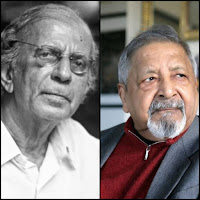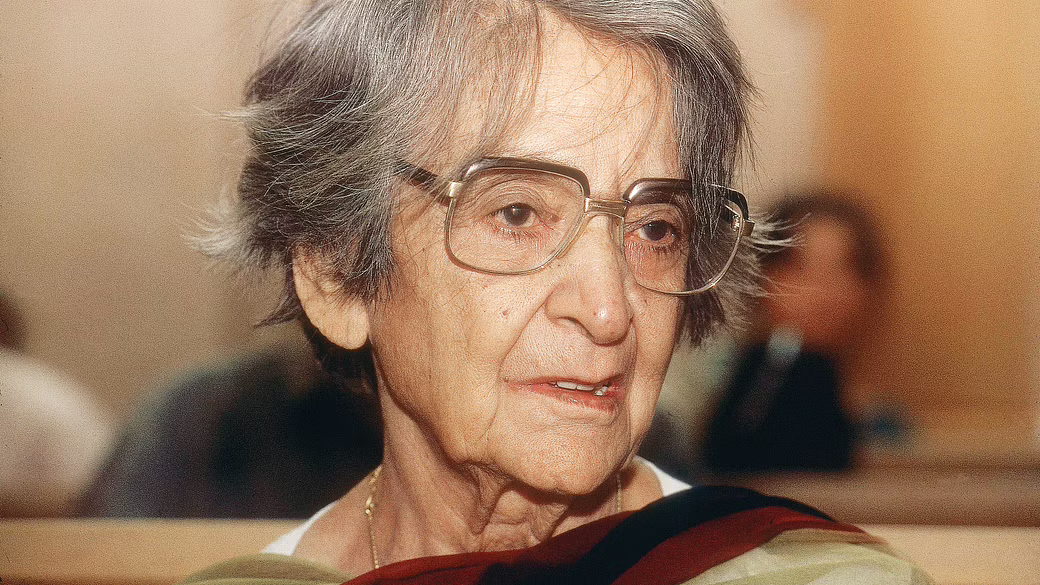NAIPAUL'S INDIA AND MINE - NISSIM EZEKIEL
NAIPAUL'S INDIA AND MINE
- NISSIM EZEKIEL
Synopsis
1. Author introduction and critical reviews
2. Examining Naipaul's India and Mine
3. Analysis
4. Contrasting Naipaul's and Nissim Ezekiel's India
5. Conclusion
AUTHOR INTRODUCTION AND CRITICAL REVIEWS
-Gayathri K
Nissim Ezekiel called “the father of independence Indian verse in English". He establish himself as a towering figures of Indian English poetry . Theme in Nissim Ezekiel poems majorly focus on Indian identity, superstitions, Love. In his poem “Poet, Lover and Birdwatcher”. He highlights his poetic style in this way:
“The best poets wait for words, The hunt is not an exercise of will".
William Walsh also remarks about the technique of Ezekiel when he says that “Ezekiel poetry more than that of any other of these writers (Indian English poets) seem to be generated from within and have within it a natural capacity for development. It. is intellectually complex, mobile emphasizing, fastidious in diction and austere in acceptance”. In the poem ‘Background, Casually’ by Nissim Ezekiel, look for themes of culture, identity, race, history, and above all the importance of a sense of belonging.
V.S.Naipaul Trinidadian writer of Indian descent known for his pessimistic novels set in developing countries. For these revelations of what the Swedish Academy called “suppressed histories,” Naipaul won the Nobel Prize for Literature in 2001.
An area of darkness containing a wounded civilisation, relieved only by a million mutinies, discovered at a much later date? That’s all? Nissim Ezekiel answered the question very trenchantly in his 1976 essay, ‘Naipaul’s India and Mine’.
The land of Naipaul’s ancestors wished to claim him, and felt spurned. When he focused on dirty streets and cramped cities, it saw him as an inheritor of the estate of Katherine Mayo, whom Mahatma Gandhi had dismissed as a “drain inspector”. The Swedish Academy preferred the first reading, describing Naipaul as “a literary circumnavigate, only ever really at home in himself”.
EXAMINING NAIPAUL'S INDIA AND MINE
-Boomika P
Nissim Ezekiel criticizes Naipaul’s book ‘An Area of Darkness' subtitled ‘An Experience in India’. Naipaul is a British writer with Indian descent, he wrote his experiences in this book after his one year stay in India. He was harassed by the Bombay custom officials during his stay. Naipaul’s roots were from India, his grandfather migrated from India to Trinidad and Naipaul spent most of his years in England. After shifting to Trinidad they Cherished the Indian culture then they slowly detached from India and started adapting to the new culture. Some of the things they kept as the memory of India are oily books, wooden printing blocks, pictures of deities, brass vessels and stick of sandalwood.
Naipaul considers India as ‘featureless' and an area of darkness, India is not influencing or inspiring to him. According to Nissim Ezekiel it is completely Naipaul’s subjective opinion. Naipaul recalls his childhood experiences in India and as a child he was unaware of the seriousness of class divisions and realizes that the country is still unchanged. Naipaul views only the negative side of India, for him India is static and struck in narrowness and not ready to change, he also addresses that women were secluded by men. Nissim Ezekiel describes that Naipaul’s view about India is wholly Subjective and it is not the whole view of India.
Nissim Ezekiel questions him how can one be truthful when one is aggressive. Ezekiel compare and contrast his ideas with Naipaul’s ideas. Naipaul states that Indian clerk will not bring water even if one faints, Nissim Ezekiel counter attacks that Indian clerk will do anything virtually if treated with humanity. Ezekiel states that Naipaul uses female fantasy that suits his work by mentioning the American woman traveler in India. Naipaul’s statements depicts his rootlessness and unwillingness to mingle with India. Nissim Ezekiel feels that Naipaul moulded the story of Malhotra and others according to him for validating his points. Nissim Ezekiel is not doubting Naipaul’s veracity but doubts his approach towards discovering truth.
ANALYSIS
-Dhivyadharshini S
Naipaul’s examples are completely subjective. All the incidents which he gives are of his opinion alone. Nissim Ezekiel tries to give it back by giving his own example. He is dissatisfied with Naipaul’s review about Indian and disagrees with his points. He says all the examples are falsifying. The reader sympathize with Mr. Naipaul when he describes that he sees, the scenes of callousness, coarseness and suffering, the everyday degradation of the human images not only among the poorest of the poor but among the middle class and in Indian society as a whole. Ezekiel calls that it’s his India and his point if view. He argues with all the examples which Naipaul expresses. He says that he’s neither proud nor ashamed of being an Indian. “Criticism is self indulgence. It must attack, even denounce, but it must not deny human beings their humanity” says Ezekiel.
CONTRASTING NAIPAUL'S AND NISSIM EZEKIEL'S INDIA
-Anandha Bairavi D
Ezekiel’s is the practical representation of a country with objective statements and understandings, Naipaul’s India is nothing but a prejudiced subjective presumptions of an opinionated author. And with surprise, it can be legitimately called as an “ land of his imagination “. Ezekiel belongs to a Jewish minority based on Mumbai who claims India to be his environment and he cannot withdraw himself from it. On the other side, Naipaul is diaspora who lives unconcerned and uninvolved either to Indian tradition or its practical events. He is called as an presumptuous outsider, “the diasporic equivalent of western traveler who quickly becomes an expert on world glimpsed fleetingly through a taxi window”. Naipaul’s India is an “ area of darkness” where he is glad he escaped. He virulently criticizes India for being uncreative, impervious to criticism, where people double think and double talk. As for him, it is asphyxiating to him and makes him faceless sans the privilege given to a immigrant in a foreign country. He sees India being gross. He criticizes the “squalor of Indian life, routine ritualism, lip service to high ideals, distorted sense of cleanliness”. Even he confronts Gandhi for the misplaced charity and calls him the “least Indian of Indian leaders” which is majorly because of his attitude towards sanitation, physical labour, services etc. All these incidents governs himself in the center of the story. Thus a valid criticism is extended by the Ezekiel’s part where he gives strong counterpart to Naipaul’s convictions and his grotesque exaggeration. He highlights on the subjective opinions of Mr. Naipaul and straightway calls him rubbish. He attacks on the invalid arguments put forth by the author and criticis
es the unbalanced biased criticism which will put India in negative terms before the world countries. This criticism is essential to understand a country which is still developing in its own way and phase. Though Ezekiel acknowledges some of the arguments unleashed by Naipaul, he doesn’t accepts the exaggerated way it is presented . When he says “all this is true but my unsatisfaction is with his mode of argument and his falsifying examples” it is truly evident.
CONCLUSION
-Dharine M S
India was never portrayed through a diasporic lens. Never before had there been so much debate among critics about whether the commentary on India was correct or incorrect. There is no potent thesis about India that can help us scale Naipaul's opinions about India.Because of Naipaul's early political views, An Area of Darkness was unofficially banned in India after its publication. Nissim Ezekiel—the Jewish Indian poet, playwright, art critic, and editor—said in a lengthy review of the book, titled "Naipaul's India and Mine," that he admired and enjoyed Naipaul's novels but objected to Naipaul's "excess" in describing India. Naipaul's criticism of India was "heavily flawed in detail," according to Ezekiel. Many years later, as if in defense, Naipaul insisted that he was simply adhering to "visual facts."Nissim Ezekiel agrees with Mr Naipaul in many instances. They both mutually share common points . One can find that Ezekiel too sees like the way of Naipaul but the only difference one can note is that the way of saying or stating differs . Through this essay we find that Ezekiel did not deny the facts of Mr Naipaul Rather he tries to point out the way of portraying ie only pointing the negative is wrong as Naipaul has mentioned in his book An Area Of Darkness . Ezekiel conclude the essay with a note of hope addressing to the citizens of India that We have to develop ( he includes himself as a citizen) and have to cling to hope.It concludes with ambiguity. There could have been no other way to end the storey. Though the book is full of dark commentary about India, as Naipaul defined it at the outset, it is that aspect of India or that aspect of Indian sensibility that remains impenetrable to him. The area of light represents his "experience, in time and place."Naipaul and India appeared to have made peace with each other's quirks, oddities, and extremes by the end of his life. The sustainability of that peace will be determined by India's cultural and political trajectory, which no one can predict.



Comments
Post a Comment